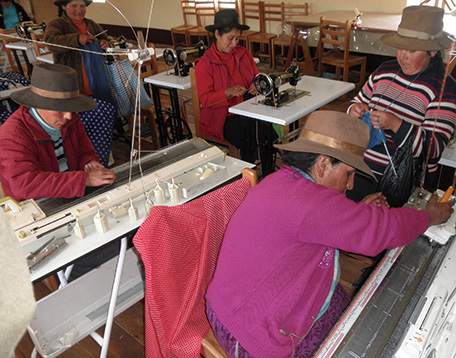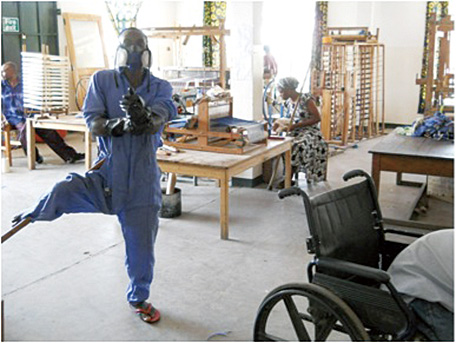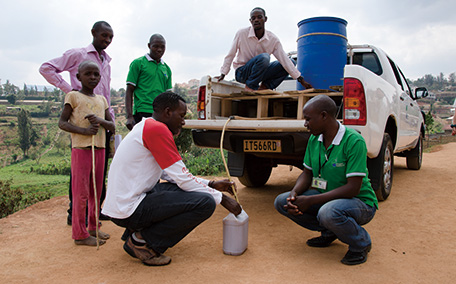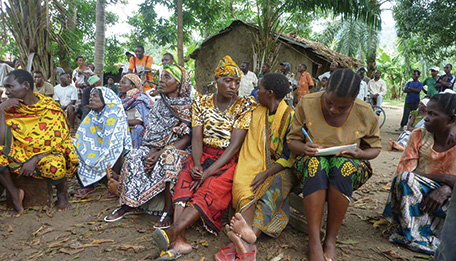Japan's Official Development Assistance White Paper 2012
(5) Partnership with Various Actors
Japan engages in international cooperation in partnership with the private sector, NGOs, universities, local governments, international organizations, and other donor countries.
●Partnership with NGOs
In recent years, NGOs have fulfilled an important role in the international community by recommending policies on major diplomatic issues such as development, the environment, human rights, trade, and disarmament. Japanese NGOs implement high-quality aid activities in developing countries, including education, health and medical care, rural development, refugee assistance, and mine clearance. In addition, Japanese NGOs provide prompt humanitarian assistance in areas affected by conflict or natural disasters like earthquakes. As NGOs work at a grass-roots level where governmental assistance has difficulty reaching, NGOs are deeply familiar with the region and are able to provide suitable response to the needs of people, as well as to promote "Visibility of Japanese Aid." Japan has advocated the promotion of partnerships with NGOs in the ODA Charter and other policies. Japan engages in a variety of collaborative measures related to NGO aid activities, including financial assistance, capacity building, and increasing dialogues between NGOs and MOFA.
a. Cooperation with NGO Projects
Japan cooperates in a variety of ways to enable NGOs to implement aid activities smoothly. For example, in FY 2011, 45 organizations utilized Grant Assistance for Japanese NGO Projects, which provides funds to grassroots-level socio-economic development projects by NGOs, to implement 81 projects, including the construction of schools, assistance for disabled persons, vocational training, and improvement of maternal and child health (the scale of the financial assistance has doubled over the last 5 years). In addition, as of July 2012, 36 NGOs participated in the Japan Platform, an emergency humanitarian aid organization established in 2000 through a partnership among NGOs, the government, and the business community. The Japan Platform utilizes ODA funds as well as donations from the private sector and individuals that have been contributed in advance to distribute emergency supplies and medical assistance when a major disaster occurs. In FY 2011 a total of around ¥2.4 billion was disbursed for projects implemented by NGOs through the JPF in 8 countries, including projects assisting the victims of the Haiti Earthquake, the droughts in the "Horn of Africa", flooding in Pakistan, and humanitarian aid in South Sudan, Northern Sri Lanka, Afghanistan and Pakistan.
In some cases, JICA's technical cooperation projects are outsourced to the private sector including NGOs, putting to use the expertise and experience of NGOs, universities, and a variety of other organizations. Further, as part of its ODA activities, JICA conducts "JICA Partnership Program (JPP)"* to outsource projects that have been proposed by NGOs, universities, and local government bodies that directly contribute to the improvement of the lives of local residents in developing countries. In FY 2011, JPP provided funds for 219 projects in 48 countries.

Local Peruvian farmers manufacturing handicrafts with alpaca fur using equipment provided. (Photo: José Sato/Embassy of Japan in Peru)

A craft center in Tanzania assisting the employment of persons with disabilities. (Photo: Masayuki Hattori/Embassy of Japan in Tanzania)
b. Establishing Better Environment for NGO Activities
Further measures to support NGO activities include projects for establishing better environments for NGOs. For example, under the "NGO Consultant Scheme," staff of Japanese NGOs who have experience and a favorable record of performance are commissioned by MOFA to address inquires from the public and NGO stakeholders regarding NGO activities in international cooperation, or the management of NGO and development education. NGO consultants also provide site services at international cooperation events and conduct classes and seminars on international cooperation, and otherwise provide opportunities for many people to deepen their understanding of NGOs and international cooperation activities. Further, measures are taken to support NGOs in strengthening their organizations, capabilities and specializations, through hosting of "NGO study groups" that serve as workshops and symposiums on such themes as "International Cooperation NGO Fundraising (raising funds for activities)" and "Strengthening the Capabilities of Local International Cooperation NGOs."
JICA also provides a variety of training for NGO staff. For example, JICA conducts (i) training for NGO organizational strengthening through the "Improve organizational skills! NGO Human Resource Development Training" for NGO staff that are to play active roles both domestically and overseas in future, (ii) Project cycle management (PCM)* method training to enable personnel to acquire project planning, proposal, and evaluation skills in developing countries, (iii) dispatching of advisors with suitable knowledge and experience to strengthen NGO's institutional capacity in terms public relations, fundraising, and accounting, and (iv) dispatching of advisors to strengthen overseas NGO projects that provide expert guidance in strengthening abilities necessary to the effective implementation of projects in overseas.
c. Dialogue and Partnership with NGOs
Since 1996, MOFA has held the NGO-MOFA Regular Meetings to promote a stronger partnership and encourage dialogue between NGOs and MOFA. NGOs and MOFA are exchanging opinions regarding ODA policies and funding assistance for NGOs such as Grant Assistance for Japanese NGO Projects. Since 2002, the NGO-Embassy Meeting has been held to exchange ideas and opinions on the efficient and effective implementation of ODA among the staff of Japanese embassies, other assistance organizations and Japanese NGOs that work in developing countries. The meetings have been held in 33 countries, including Nepal and Sri Lanka. JICA also hosts the NGO-JICA Meeting in order to promote the realization of effective international cooperation and the understanding and participation of civil society in international cooperation, based on an equal partnership with NGOs. In addition to supporting local NGO activities, Japan has also established an NGO-JICA Japan Desk in 21 countries to strengthen projects conducted jointly by NGOs and JICA.
- *JICA Partnership Program (JPP)
- A technical cooperation program implemented by JICA as part of ODA to contribute to the development for people in developing countries at the grass-roots level in collaboration with partners in Japan willing to engage in international cooperation, such as NGOs, universities, local governments and public interest corporations. There are three types of JPP based on the size and nature of the organizations, which are classified as follows: (i) Partner Type (Project amount not exceeding ¥100 million and to be implemented within five years), (ii) Support Type (Project amount not exceeding ¥25 million and to be implemented within three years), (iii) Local Government Type (Project amount not exceeding ¥30 million and to be implemented within three years).
- *Project cycle management (PCM)
- The PCM method is a participatory development method of utilizing a project overview chart to manage operation of the cycle of analysis, planning, implementation, and evaluation of a development assistance project.It consists of participatory planning, monitoring, and evaluation. The technique is used by JICA and international organizations, etc., at the site of development assistance.
●Partnership with Private Business
a. Public-Private Partnership (PPP) for boosting growth
Japanese private companies' activities in developing countries make significant contribution, by creating opportunities for local employment, augmenting tax revenue, expanding trade and investment, contributing to the acquisition of foreign currency, and transferring Japan's superior technology. In April 2008, Japan announced the "Public-Private Partnership for Growth in Developing Countries" - a new policy to strengthen partnerships between ODA and Japan's businesses and to promote activities by private businesses in developing countries. Through this, the government receives consultation and proposals from private sectors related to their activities which are conducive to economic growth and poverty reduction in developing countries, as well as public-private cooperation projects together with ODA.
In the past, 13 public-private partnership projects have been authorized including those which utilized Grant Assistance for Grass-Roots Human Security Projects. One instance was a project to utilize Grant Assistance for Japanese NGO Projects for mine clearance and unexploded ordnance disposal from farmland when Japanese businesses conducted herbal medicine cultivation in Laos. Another case was a project to utilize technical cooperation to invite a team of Mexican physicians to Japan for training of sophisticated medical technology (catheterization surgery) that had been developed by a Japanese company. (See this for details)
Likewise, attention has focused recently on Corporate Social Responsibility (CSR) activities, in which private businesses aim to contribute proactively to resolving the issues in local communities they enter, and also on BOP business*, which aims to contribute to improving lives and resolving social issues through businesses focusing on the low-income demographic. In cases where these activities are implemented by private corporations in partnership with local NGOs, it has been allowed to utilize Grant Assistance for Grass-Roots Human Security Projects and technical cooperation. In addition, Japan works on Public-Private Partnership* (PPP) that aim to implement highly public projects more efficiently and effectively, and provides consistent assistance from the planning stages of the project, such as institutional development and human resource development through technical cooperation, with utilizing Private-Sector Investment Finance or ODA loans.
Furthermore, at the Millennium Development Goals (MDGs) Follow-up Meeting held in June 2011, Japan announced the establishment of the "MDGs Public-Private Partnership Network." This network assists the smooth implementation of business and social contribution activities in developing countries by Japanese companies, and promotes their activities towards to the achievement of the MDGs through providing them with: information on the development needs of recipient countries; assistance in creating networks through introducing domestic and overseas NGOs, international organizations, and universities; and workshops on health and post MDGs, for example.
■Cooperation Preparatory Surveys for PPP Infrastructure Projects and BOP Business Projects
To encourage participation to international cooperation from Japanese businesses with excellent technologies, knowledge and experience which are interested in overseas expansion, JICA provides two types of preparatory survey schemes based on private sector proposals. These schemes offer conducting a feasibility study* to private companies that submitted the proposals for PPP infrastructure projects and BOP business projects. In the past, JICA has selected 34 PPP infrastructure projects such as expressways, water supply and sewerage systems, and 52 projects related to BOP business projects in the areas of health and medical care and agriculture. In addition to utilizing the specialized knowledge, funds, and technologies of private sectors to resolve the development issues of developing countries, this gives a push to the overseas expansion of private business as well.

Organic solutions staff engaged in the mobile retail of microorganisms cultivated in Rwanda. (Photo: Kenshiro Imamura/JICA)
■Assisting Small and Medium Enterprises (SMEs)
It is crucial to incorporate the economic growth of rapidly developing emerging and developing countries for Japanese businesses in terms of their future growth. In particular, although Japan's small and medium enterprises (SMEs) possess superior products and technologies, due to insufficient human resources, knowledge and experience, many businesses have not embarked on overseas expansion. On the other hand, it is expected that such products and technologies will be utilized to resolve socio-economic issues in developing countries. In response to this situation, since FY 2012, MOFA has started needs surveys such as for the products and technologies of Japanese SMEs in developing countries, studies to formulate ODA projects, and outsourcing projects for proliferating products and technologies through ODA. This attempts to resolve development issues in developing countries while contributing to the overseas expansion of Japanese businesses. Additionally, as to assist the development of global human resources required by SMEs, the "Private-Sector Partnership Volunteer System"*, which dispatches staff from SMEs to developing countries as Japan Overseas Cooperation Volunteers (JOCV) or Senior Volunteers (SV), while keeping their membership in enterprises, was established in 2012. Through this system, Japan proactively assists to build SMEs' network within developing countries. Similarly, the Ministry of Economy, Trade and Industry (METI) has also assisted the overseas expansion of Japan's SMEs through the new Global Internship Program by dispatching young business persons, and a symposium on fostering global human resources co-hosted with JICA in November 2012. (For further details on assisting SMEs, see Part I).
■Private-Sector Investment Finance
The high risk involved in projects in developing countries often makes funding from private financial institutions difficult. Therefore, Japan uses JICA Private-Sector Investment Finance* to assist the development projects implemented by private businesses in developing countries through direct investment and financing. Regarding Private-Sector Investment Finance, the "Reorganization and Rationalization Plan for Special Public Corporations" announced in December 2001 stipulated that there would be no investment and financing except for projects authorized before the end of 2001. However, due to an increase in the necessity to respond to new demands of high development impact through the private sector, a resumption was decided in June 2010, and trials of Private-Sector Investment Finance from JICA to private businesses were resumed in March 2011.
As a result, government review of a pro-poor micro-financing project (small-scale financing service) in Pakistan and an industrial human resource development project in Viet Nam was completed in 2011, and also in 2012 of a project related to an environmentally-friendly industrial park in Long An Province, Viet Nam. After that, it was fully resumed in October 2012.
■Infrastructure Exports*
The "Ministerial Meeting on Deployment of Integrated Infrastructure Systems" was established to respond to the enormous infrastructure demand particularly in Asia, support efforts by private business in the infrastructure area, and make dynamic, cross-national, and political leadership. In this context, MOFA has appointed 126 "Specialists in Infrastructure Projects"* at 58 overseas diplomatic missions in 50 countries (as of October 2012), to strengthen systems for gathering information through overseas diplomatic missions, and enhance communication with related local organizations and chambers of commerce. In addition, the Prime Minister and members of the cabinet are leading Japan's marketing effort to receive orders for infrastructure projects.
b. Acceleration of ODA Loans Procedures
Public-private partnership has become widely recognized as necessary for development assistance to developing countries. It is important to produce development effects promptly through effectively incorporating ODA loans and private-sector business. From the standpoint of promoting effective public-private partnership (PPP) as well, further efforts are required to provide ODA loans at the same pace of private sector business activities.
While giving attention to ensure accountability and appropriate procedures, through ensuring ownership of the recipient countries, preventing fraud and corruption, and considering the environmental and social impact of projects, Japan announced Measures to Accelerate ODA Loans Procedures in July 2010, with consideration to its "Measures to Accelerate ODA Loans Procedures" announced in 2007 and "Measures to Accelerate ODA Loans Procedures by Expediting Public-Private Partnerships" published in 2009. The measures include additional actions such as the implementation of "pre-pledges," increasing the number of countries which hold on-site monitoring meetings and detecting problems at an early stage, and holding discussions regarding countermeasures.
●Partnership with Universities and Local Governments
Japan utilizes the practical knowledge accumulated by universities, as well as local governments to implement ODA more effectively. JICA promotes the joint implementation of comprehensive technical cooperation and ODA loan projects to make it possible to utilize the specialized knowledge possessed by universities to address the challenges of developing countries. In addition, JICA cooperates with local governments to utilize their knowledge and experience to work toward qualitative improvement of ODA projects, development of human resources for aid activities, and vitalization of regional project development.
●Partnership with Local Governments and NGOs of Developing Countries
Partnerships with local governments and NGOs in developing countries strengthen not only the socio-economic development of developing countries, but also lead to the strengthening of civil society and NGOs in those countries as well. Japan mainly utilizes Grant Assistance for Grass-Roots Human Security Projects to support socio-economic development projects implemented by aid-related personnel. This financial cooperation has also received high praise in developing countries as a detailed and rapid form of assistance that provides direct benefit at the grassroots level including the construction of schools, upgrading of hospital basic medical equipment and digging of wells.
●Partnership with International Organizations and Other Countries
In recent years, from the perspective of improving the quality of aid and aid effectiveness, based on the Paris Declaration and the Accra Agenda for Action (AAA) and Busan Partnership for Effective Development Cooperation, various countries and aid organizations have been working to coordinate their aid policies in order to achieve international development goals such as MDGs. Currently, working groups have been formed for various development issues such as health and education in many recipient countries, and program-type assistance is being implemented in accordance with the sector development strategy of the recipient countries. Japan participates in many of these programs, such as the reform of local administration in Tanzania. Further, in 2005, Japan, the World Bank, the Asian Development Bank (ADB), and the UK's Department for International Development (DFID) have prepared a Joint-Strategy partners initiative for Bangladesh to support a poverty reduction strategy (PRS). Subsequently, the Joint Cooperation Strategy (JCS) to Bangladesh was formulated in June 2010 with the participation of 18 development partners to work together in coordination and collaboration for more effective and efficient cross-sectors assistance (for instance, having a link between health and education fields). Likewise, as specific cooperation with the Multilateral Development Banks (MDBs), in 2005 the Enhanced Private Sector Assistance for Africa (EPSA) was setup together with the Africa Development Bank (AfDB), and to date cooperation of over $1 billion has been implemented to attempt to smoothly supply funds to Africa’s private sector and promote private sector investment for upgrading of roads and electricity, etc. Furthermore, in 2012, together with the Inter-American Development Bank, Confinancing for Renewable Energy and Energy Efficiency (CORE) was set up as a co-finance framework with a vision of a maximum of $300 million worth of cooperation over five years.
Recently, Japan has also been proactive in cooperation and collaboration with international organizations that have offices in Japan. Moreover, Japan promotes initiatives that aim for an effective partnership of multilateral aid and bilateral aid. The objectives of this partnership are to reflect trends in international aid into the bilateral aid policies, and at the same time promote mainstreaming of Japan’s bilateral aid methods which have comparative advantage, within the recipient countries and the international community.
In the past, members of the Development Assistance Committee (DAC) of the Organisation for Economic Co-operation and Development (OECD) have been the main donor countries in the international community, but in recent years, non-DAC member countries that are referred to as "emerging donors" such as China, India, Saudi Arabia, and Brazil have begun to have a significant impact on the development of developing countries. Within the framework of the G20 also, consultation on development issues has begun to be implemented not only by the main donor countries but also including emerging and developing countries. Japan has encouraged the emerging donors to promote aid coordination and harmonization with international efforts. For example, significant progress was made in the Fourth High Level Forum on Aid Effectiveness held in Busan, Republic of Korea in November 2011, that a new framework for cooperation to solve global issues called "Global Partnership" was created among DAC member countries including Japan, emerging donors, the private sector, and other organizations. Similarly, the Asia Development Forum was held in Bangkok in July 2012 to share the Asian experience in implementing development assistance.

Village meeting in Tanzania. Villages tackle community issues themselves. (Photo: Yoshiaki Kakizaki/JICA Tanzania Office)
- *BOP (Base of Pyramid) business
- Refers to businesses that are expected to be useful in resolving social issues for low-income groups* in developing countries. Accounting for approximately 70% of the world's population, or about 4 billion people, low-income groups are attracting attention as a market with potential for growth. This type of business targets low-income groups as consumers, producers, and sellers, which is expected to be useful in providing sustainable solutions to a variety of local societal problems.
Examples: Hygiene products such as detergent and shampoo, water purifying agents, nutritional products, insecticide-treated mosquito nets, solar power panels, etc.
* Low-income group: The income bracket with an annual income per capita of $3,000 or less in purchasing power parity. Purchasing power parity is determined by removing differences between price levels to make purchasing power between different currencies equivalent. - *Public-Private Partnership using ODA (PPP: Public-Private Partnership)
- A new method of cooperation in which governmental ODA projects are conducted in collaboration with private investing projects. Input from private businesses is incorporated at the formation stage of the project. For example, basic infrastructure is developed with ODA, while investing and operations/maintenance is conducted by the private sector. In this manner, roles are divided between the public and private sectors. The technologies, knowledge, experience, and funds of the private sector are then used in an effort to implement projects that are more efficient and effective, as well as to improve development efficiency.
(Areas for PPP: Water and sewer systems, airport construction, motorways, railways, etc.) - *Feasibility study
- Verification that a proposed project can be executive (achieved), and planning/formulation of a project that is suitable for implementation. An investigation regarding what possibilities the project has, whether it is appropriate, and what investment effect it will have.
- *Private-Sector Partnership Volunteer System
- This system dispatches staff from SMEs to developing countries as Japan Overseas Cooperation Volunteers (JOCV) or Senior Volunteers (SV), and contributes to the development of global human resources of enterprises and the overseas business expantion. The country, occupation type, and duration of dispatch are determined in response to requests from private enterprises. Volunteers are dispatched to countries being considered for the expantion of a business, and it is expected that the culture, commercial practices, and technical level therein will be ascertained through activities, and that volunteers acquire not only language skills but also communication skills, problem solving skills and negotiating skills that will be put back into corporate activities upon their return.
- *JICA Private-Sector Investment Finance
- Utilization of JICA's loan aid to provide the investment and financing required for development business implemented by Japanese private companies in developing countries. The projects of private businesses in developing countries create employment and lead to the revitalization of the economy, but in many cases there are a variety of risks and no outlook for high gains, so it is difficult to obtain sufficient funds from private financial institutions. Private-Sector Investment Finance by JICA is used to support development in developing regions by providing the investment and financing for such businesses. The aid targets (i) MDGs and the poverty reduction, (ii) acceleration of infrastructure development and growth, and (iii) measures against climate change. Unlike ODA loans, which consist of economic cooperation provided to the governments of developing countries, Private-Sector Investment Finance contributes to development by supporting the activities of Japanese private businesses that are conducted with non-governmental private businesses in developing countries.
- *Infrastructure Exports
- This concept is related to infrastructure demands primarily from Asia which supports the efforts of private businesses in relation to overseas infrastructure upgrades by Japanese businesses such as electricity, railways, water, and road projects. It focuses not only on structural (hard) infrastructure such as facility construction, but assists as far as non-structural (soft) infrastructure upgrades such as the transfer of knowledge, experience and skills necessary to run the project, as well as human resource development related to administrative operation.
- *Specialist in Infrastructure Projects
- Personnel assigned to individual overseas diplomatic missions to support infrastructure exports, by gathering and consolidating domestic and overseas information regarding infrastructure projects, and by serving as liaison for communication and coordination with related organizations, chambers of commerce, etc.
